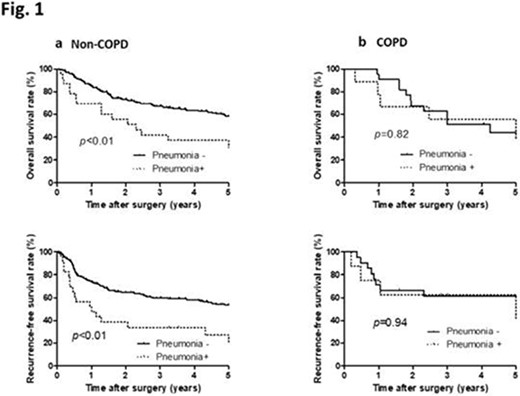-
PDF
- Split View
-
Views
-
Cite
Cite
Ryo Saito, Suguru Maruyama, Yoshihiko Kawaguchi, Hidenori Akaike, Katsutoshi Shoda, Yudai Higuchi, Hiroto Tanaka, Daisuke Ichikawa, 335. IMPACT OF POSTOPERATIVE COMPLICATIONS ON LONG-TERM OUTCOMES AFTER ESOPHAGECTOMY, Diseases of the Esophagus, Volume 37, Issue Supplement_1, September 2024, doae057.096, https://doi.org/10.1093/dote/doae057.096
Close - Share Icon Share
Abstract
Recently, it has been reported that postoperative complications after esophagectomy not only prolong hospital stay and reduce quality of life, but also have impact on the long-term outcomes. However, this still remains controversial. Here, we aimed to evaluate the prognostic impact of postoperative complications after esophagectomy, focusing on the type and severity of complications. In addition, we examined the impact of postoperative pneumonia on long-term prognosis stratified by the presence of COPD.
In total, 254 consecutive patients who underwent esophagectomy for esophageal cancer between 2009 and 2021 were eligible. We examined the association between postoperative complications and long-term outcomes. Severe postoperative complications can be defined as C-D III-V in this study.
Postoperative complications occurred in 150 out of 254 cases (59.1%). Patients with postoperative pneumonia and anastomotic leakage had significantly lower OS, CSS and RFS rates compared to those without, whereas other complications were not associated with long-term outcomes. Regarding severity, non-severe complications did not affect long-term prognosis, whereas patients with severe complications significantly lower OS, CSS, and RFS rates (P < 0.01). In addition, patients without COPD who developed postoperative pneumonia had significantly lower long-term outcomes (P < 0.01). However, in patients with COPD, no survival difference between patients with and without postoperative pneumonia was observed.
Severe postoperative pneumonia and anastomotic leakage were found to strongly influence the long-term outcomes. Meanwhile, postoperative pneumonia may have a minimal impact on long-term outcomes in COPD patients.




